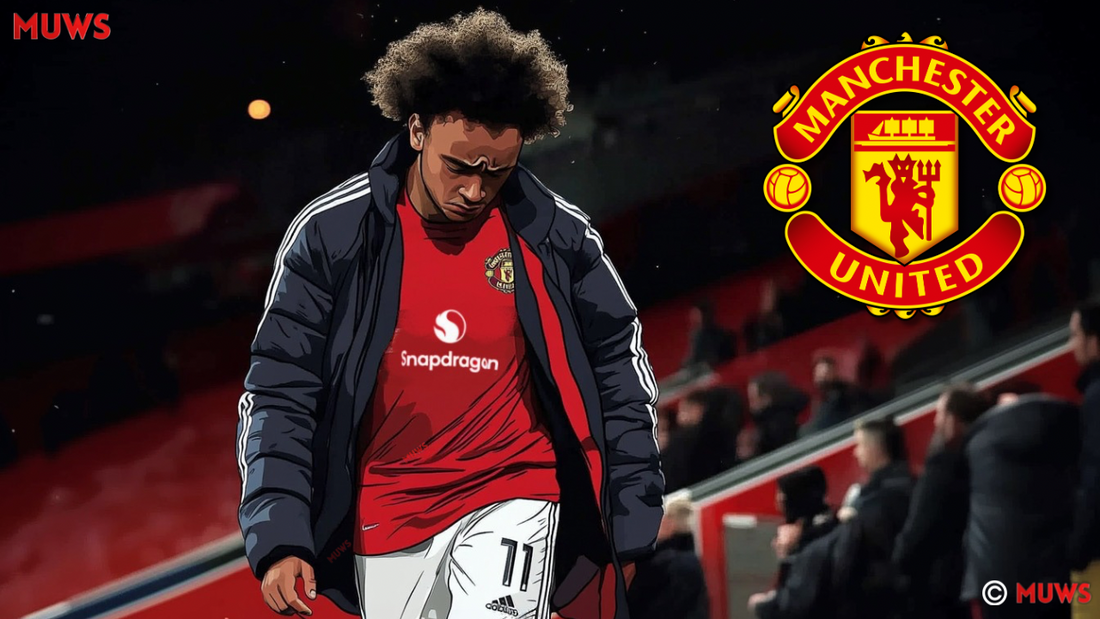
Joshua Zirkzee: A Scapegoat in the Theatre of Toxicity
Share
Joshua Zirkzee’s substitution during Manchester United’s 2-0 loss to Newcastle at Old Trafford was a moment that encapsulated the dark side of modern football fandom. Withdrawn after just 32 minutes to make way for Kobbie Mainoo, Zirkzee left the pitch amid a chorus of jeers and cheers from his own fans. According to journalist Raphael Honigstein, the young forward was visibly emotional, with tears in his eyes as he headed down the tunnel before returning to the bench.
This was a humiliating moment for Zirkzee (23), who became the scapegoat for a collective poor performance. Astonishingly, he wasn’t even the worst player on the pitch—he was simply the one sacrificed for a tactical change by Ruben Amorim. The crowd’s reaction, however, highlighted a troubling trend: the dehumanisation of footballers by sections of toxic fanbases.
Legendary Manchester United manager Sir Alex Ferguson used to strongly oppose making early substitutions due to their potential psychological impact. In his autobiography, Managing My Life, Ferguson reflected:
“I learned that substituting a player early in the game, unless due to injury, could destroy his confidence. It’s a decision that must be weighed carefully.”
In his later book, Leading: Learning from Life and My Years at Manchester United, Ferguson further emphasized the importance of protecting player morale:
“Protecting the confidence of players is crucial. Making a substitution in the first half, barring injury, can have lasting negative effects on a player’s psyche.”
Ferguson’s words highlight the responsibility managers and fans alike have in safeguarding players’ mental well-being. Zirkzee’s treatment at Old Trafford starkly contrasts with this ethos. The £36.5m summer signing from Bologna has struggled to make a significant impact at Manchester United so far but he did not deserve the boos and jeers from a sizeable number of the crowd on Monday night.
According to StatsZone, Zirkzee completed just 3 of 9 passes in his short spell on the pitch but the entire team looked lost and out of their depth against a well organised Newcastle side.

Rúben Amorim, visibly deflated by the result, acknowledged the difficulty of the moment to Sky Sports:
“Josh is a Manchester United player. We sometimes want more power in front. We sometimes concede from set pieces so today we had more guys able to defend set pieces. We are trying to cope with every problem in the team. You have to think about the team and about the player because the player was suffering. I have been there.
“I felt that the team was suffering and needed another midfielder to have more of the ball. It was really tough for me to do that (take off Zirkzee) and I spoke to Josh about that. It is important for me to express that message to him. I am always thinking about the team and that moment was important for that team.
“Josh is a really good guy. When he went down the tunnel, there are some guys who are in a bad way. He is a really good lad. He has our support and he will prepare for the next guys. That is life in every profession. We will support Josh.”
“It was a very difficult moment, and he’s a human being, but he felt the support of the fans, so everything was okay in the end.”
Despite Amorim’s reassurances, this incident left a bitter taste. Footballers are human beings first, not outlets for fan frustrations. Zirkzee’s undeniable talent means he’ll thrive in a system more suited to his style, but his treatment underscores the need for greater empathy within the game.
Sir Alex Ferguson’s approach serves as a timeless reminder that every decision—whether tactical on the pitch or managerial off it—carries lasting consequences for players and the team as a whole. Booing or sarcastically jeering a player, like they have done with Zirkzee, can deeply affect their confidence and hinder their development. Players thrive on encouragement and belief from their fans; when that support is replaced with negativity, it can lead to self-doubt, reduced performance, and even long-term harm to their mental health and professional growth.
For a young player like Zirkzee, who is likely still finding his rhythm and adapting to a high-pressure environment at Manchester United, the criticism can feel overwhelming. Footballers are not immune to the psychological toll of public judgment, and jeers from their own fans—the people who are meant to back them—can create a toxic atmosphere. Instead of motivating the player to improve, it often has the opposite effect, pushing them further away from their potential.
Fans must remember that players, especially young ones, are human beings who need time, patience, and constructive support to flourish. Respect and understanding should always come first, as fostering a positive environment is crucial not only for the individual player but for the collective success of the team. Creating a culture of unity rather than division ensures that players feel supported even when they make mistakes, allowing them to grow and contribute their best to the club.
